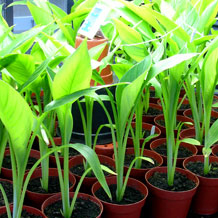- Home
- About the alliance
- Key researchers
- News
- Events
- Case studies
- Climate science: wheat can’t stand the heat
- Controlling major diseases of world crops
- Farming to feed the nation
- Food security in early modern England
- Healthy Food from Healthy Animals
- Helping UK wheat breeders through genomics
- Impacts of agriculture on greenhouse methane capture by soils
- Livestock can produce food that is better for people and the planet
- Managing sheep scab
- Parasitoid webs in organic and conventional farming systems
- Positively managing ecosystems to increase their service value
- Predicting and protecting our pollinators
- Promoting sustainable food consumption and production
- Putting a stop to pain and distress in farm animals
- Seagrass and food security
- Technology to improve water usage efficiency
- The 'push-pull' cropping system
- The North Wyke Farm Platform
- Towards sustainable agriculture
- Transparency of food prices
- Yes we (may) have no bananas
- South West Biosciences Doctoral Training Partnership
- Contact us

Banana plants in cultivation.
Yes we (may) have no bananas – impact of bacterial Xanthomonas wilt in Africa
University of Exeter
Researchers: David Studholme, Murray Grant and Julian Smith (FERA)
Funder: National Agricultural Research Organisation of Uganda (NARO)
Research is investigating how bacterium could have jumped from sugarcane to bananas; the project is then creating a genetic enhancement of the banana’s defences, after the disease devastated the livelihoods of millions of people.
The project between University of Exeter and National Agricultural Research Organisation of Uganda (NARO) is addressing questions about Banana Xanthomonas Wilt (BXW).
The project’s long-term objective is to develop resistance to BXW; to do this the team need to first understand the pathology, and then design intervention strategies.
Banana is propagated vegetatively so traditional breeding methods are extremely slow and difficult. No BXW-resistant germplasm has been identified either, so resistance to BXW must be achieved by genetically enhancing the banana’s defences.
The research team being lead by Dr David Studholme and Professor Murray Grant, have used genome sequence data from Xcm and related strains from other crops to reveal the genetic basis of these ‘host-jumps’.
The research data can also be used to develop and validate diagnostics to measure genetic plasticity of Xcm populations and detect newly emerging virulent lineages.
Bananas and plantains are major food staples and cash crops in the East African Great Lakes zone. In the last decade the BXW was first identified on Enset, a plant related to the banana, in Ethiopia in the 1960s, and discovered on Ugandan bananas in 2001. It has since spread into neighbouring Kenya, DR Congo, Rwanda and Burundi and Tanzania (2007).
BXW can become epidemic within weeks, leading to complete crop loss. Many families have abandoned banana cultivation, which has caused unsustainable increases in food price.
We hope our work with collaborators in the region to understand how this new and devastating pathogen arose will lead to its control or eradication. We expect to learn lessons that will apply to other newly emerging diseases.
Dr David Studholme, Biosciences


